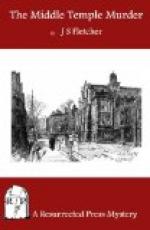“JOHN MAITLAND, aged 42, bank manager, of the Bank House, High Street, Market Milcaster, was formally charged with embezzling, on April 23rd, 1891, the sum of L4,875 10_s_. 6_d_., the moneys of his employers, the Market Milcaster Banking Company Ltd., and converting the same to his own use. The prisoner, who appeared to feel his position most acutely, and who looked very pale and much worn, was represented by Mr. Charles Doolittle, the well-known barrister of Kingshaven; Mr. Stephens, K.C., appeared on behalf of the prosecution.
“Maitland, upon being charged, pleaded guilty.
“Mr. Stephens, K.C., addressing the Recorder, said that without any desire to unduly press upon the prisoner, who, he ventured to think, had taken a very wise course in pleading guilty to that particular count in the indictment with which he stood charged, he felt bound, in the interests of justice, to set forth to the Court some particulars of the defalcations which had arisen through the prisoner’s much lamented dishonesty. He proposed to offer a clear and succinct account of the matter. The prisoner, John Maitland, was the last of an old Market Milcaster family—he was, in fact, he believed, with the exception of his own infant son, the very last of the race. His father had been manager of the bank before him. Maitland himself had entered the service of the bank at the age of eighteen, when he left the local Grammar School; he succeeded his father as manager at the age of thirty-two; he had therefore occupied this highest position of trust for ten years. His directors had the fullest confidence in him; they relied on his honesty and his honour; they gave him discretionary powers such as no bank-manager, probably, ever enjoyed or held before. In fact, he was so trusted that he was, to all intents and purposes, the Market Milcaster Banking Company; in other words he was allowed full control over everything, and given full licence to do what he liked. Whether the directors were wise in extending such liberty to even the most trusted servant, it was not for him (Mr. Stephens) to say; it was some consolation, under the circumstances, to know that the loss would fall upon the directors, inasmuch as they themselves held




